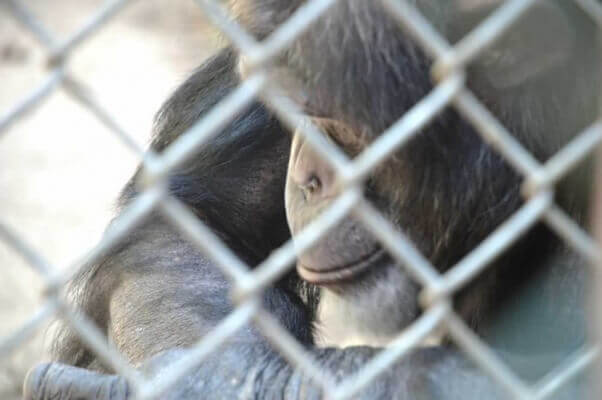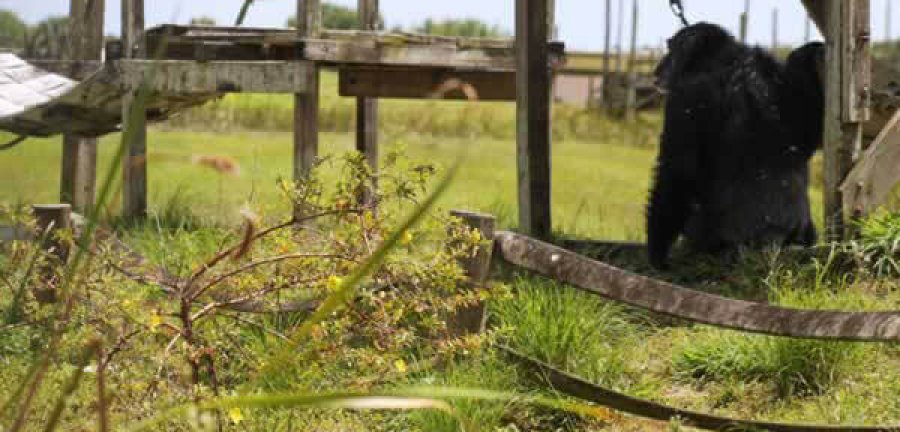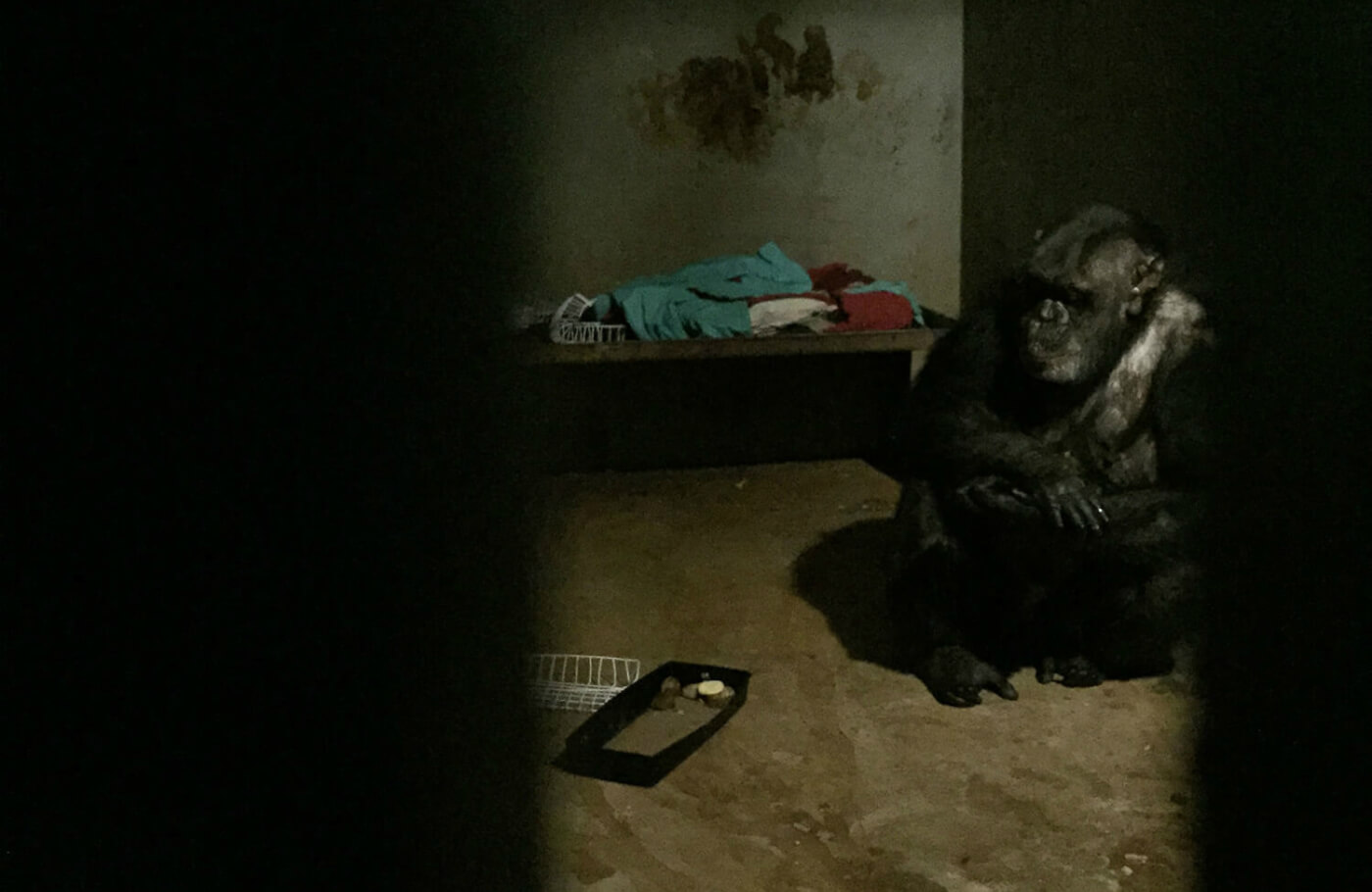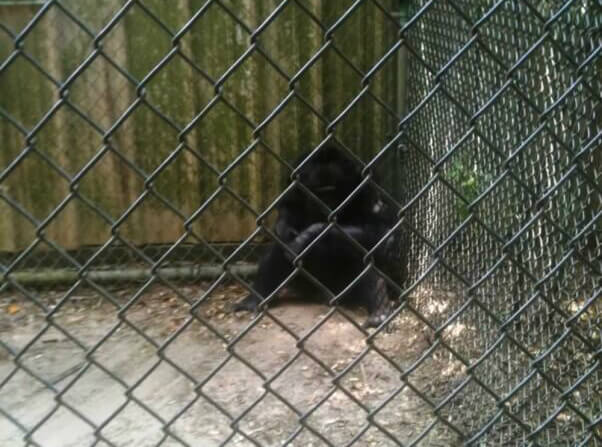This excerpt is originally featured in PETA’s new book, Love and Rescue: Tales of Survival, available for purchase in the PETA Catalog.
****
It’s like something out of a Victorian-era mental asylum: The windowless cell measuring about 8 feet by 16 feet, roughly the size of a walk-in closet, was cold and dark, and feces covered the walls. But the room that we’re describing wasn’t built 150 years ago—this 21st century “dungeon” is located at a seedy roadside zoo in Georgia deceivingly called the Chestatee Wildlife Preserve & Zoo, and it’s where a 32year-old chimpanzee named Iris was kept confined for years.
Iris’ meals were slid to her through a slot in the wall. She had virtually no opportunities to climb and no one to play or socialize with. For years, her world consisted of four blank walls. Falling into a state of desperate loneliness, she often huddled under a filthy blanket in the unheated cell and sometimes passed the interminable hours smearing the walls with her own feces.
Denied sunlight, exercise, and fresh air, Iris was pale and overweight. Her canine teeth were missing, likely yanked out when she was small in order to make her less dangerous to handle. Her cell was cleaned only about twice a week, so she was usually forced to live amid her own waste. This intelligent and social great ape, who should have been allowed the opportunity to nurture and raise babies, and pass down her knowledge to younger generations, was being warehoused like a pile of old magazines.
Every once in a while, Iris was allowed into a slightly larger concrete cell. But instead of providing relief, it was no better. The floor was strewn with feces and dead cockroaches, and spiders crawled among the cobwebs on the ceiling and walls. It was scant improvement.
It’s likely that Iris had given up all hope. It probably never crossed her mind—and maybe that’s a blessing—that she could wish for anything other than this unrelenting hell. She had no way of knowing that her life was about to be transformed.
Thanks to a generous PETA supporter who footed the bill for her travel expenses, Iris got the sweepstakes win of a lifetime—a one-way ticket to a lush, tropical sanctuary in Florida called Save the Chimps. But her rescuers held their collective breath: How would she react to seeing other chimpanzees after so many years of solitary confinement, loneliness, and hopelessness?
Shortly after arriving at Save the Chimps, Iris was introduced to another rescued chimpanzee, named Abdul. Normally, introductions like this take months of cautious interaction, but for this pair, it was love at first sight. They were immediately smitten with each other—panting and hooting with delight, grooming each other, and exchanging kisses and hugs like an old married couple.
Within weeks, Iris was no longer the pale shell of a chimpanzee that she had been when she arrived at the sanctuary. It took some time for her eyes to adjust to sunlight—it had been so long since she’d seen it!— but with each passing day, with opportunities to climb, run, and play, she got stronger. When she was carefully released into a larger group, she boldly walked right up to a chimpanzee named Pam and embraced her. It’s as if she had saved up all the hugs and kisses that she had saved up over the years that she had spent alone and simply couldn’t wait to distribute them.
Although she still has some nervous moments, Iris enjoys exploring the sanctuary’s island habitat, where she can often be found sunbathing. She loves making nests out of blankets—thick, clean ones that are nothing like the tattered, filthy one that she once clutched in that awful roadside zoo prison cell. She has a new favorite food, too—romaine lettuce!
Thanks to PETA members and sanctuary staff, as well as the emotional support of her chimpanzee friends, Iris is putting the years she spent suffering in a “dungeon” behind her.







